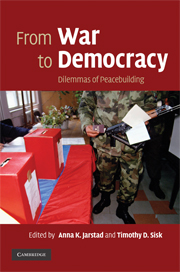Book contents
- Frontmatter
- Contents
- List of tables
- About the authors
- List of acronyms
- Acknowledgments
- Introduction
- Part I The perils of war-to-democracy transitions
- Part II The security context
- Part III The political process
- Part IV International engagement
- 8 International responses to crises of democratization in war-torn societies
- 9 Peacebuilding as democratization: findings and recommendations
- References
- Index
8 - International responses to crises of democratization in war-torn societies
Published online by Cambridge University Press: 14 May 2010
- Frontmatter
- Contents
- List of tables
- About the authors
- List of acronyms
- Acknowledgments
- Introduction
- Part I The perils of war-to-democracy transitions
- Part II The security context
- Part III The political process
- Part IV International engagement
- 8 International responses to crises of democratization in war-torn societies
- 9 Peacebuilding as democratization: findings and recommendations
- References
- Index
Summary
Post-war situations are difficult periods of transition, involving many simultaneous dilemmas for new and inexperienced governments. Historically, the Weimar Republic in defeated Germany is a classical case, where the first democratic government led by Social Democrats had to administer the disaster created by the previous regime and also do this while abiding by the punitive stipulations of the Versailles Peace Treaty. Germany struggled through a turbulent period of the 1920s, only to be severely hit by the Great Depression with mass unemployment and the exploitation of these conditions by a ruthless new challenge, the Nazis. Central issues in Hitler's agitation were the Versailles Treaty and the weakness of democratic governance. The international community at the time chose to take a hands-off attitude, and allowed the Treaty to be undermined parallel to the elimination of democracy. A new, even more devastating, war began, twenty years after the ending of the previous one. This example highlights the significance of peace conditions, as well as the importance for international organizations to be concerned with their broader implications. The fate of the Weimar Republic and the rise of Nazi Germany created a lasting guilt feeling among democratic states.
Peacemaking today differs in many respects, but the historical lessons should always be kept in mind. The transition from war to peace is cumbersome and the hope to build a functioning democracy should be cautioned with a need for long-term thinking and an understanding of the dangers of failure.
- Type
- Chapter
- Information
- From War to DemocracyDilemmas of Peacebuilding, pp. 213 - 238Publisher: Cambridge University PressPrint publication year: 2008
- 1
- Cited by



